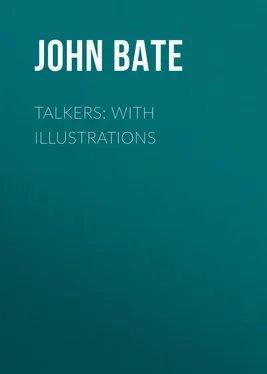John Bate - Talkers - With Illustrations
Здесь есть возможность читать онлайн «John Bate - Talkers - With Illustrations» — ознакомительный отрывок электронной книги совершенно бесплатно, а после прочтения отрывка купить полную версию. В некоторых случаях можно слушать аудио, скачать через торрент в формате fb2 и присутствует краткое содержание. Жанр: foreign_antique, foreign_prose, на английском языке. Описание произведения, (предисловие) а так же отзывы посетителей доступны на портале библиотеки ЛибКат.
- Название:Talkers: With Illustrations
- Автор:
- Жанр:
- Год:неизвестен
- ISBN:нет данных
- Рейтинг книги:5 / 5. Голосов: 1
-
Избранное:Добавить в избранное
- Отзывы:
-
Ваша оценка:
- 100
- 1
- 2
- 3
- 4
- 5
Talkers: With Illustrations: краткое содержание, описание и аннотация
Предлагаем к чтению аннотацию, описание, краткое содержание или предисловие (зависит от того, что написал сам автор книги «Talkers: With Illustrations»). Если вы не нашли необходимую информацию о книге — напишите в комментариях, мы постараемся отыскать её.
Talkers: With Illustrations — читать онлайн ознакомительный отрывок
Ниже представлен текст книги, разбитый по страницам. Система сохранения места последней прочитанной страницы, позволяет с удобством читать онлайн бесплатно книгу «Talkers: With Illustrations», без необходимости каждый раз заново искать на чём Вы остановились. Поставьте закладку, и сможете в любой момент перейти на страницу, на которой закончили чтение.
Интервал:
Закладка:
His conduct was becoming unbearable. I had never seen him in such an objectionable light. I almost wished he had gone to Bombay rather than have called at my house that evening. I expected an intellectual “feast of fat things” from my friends, and just as I was in the act of tasting, in came this talker and substituted his fiddle-faddle of saws and stories, which he had repeated, perhaps, a hundred times. We were jaded with his superfluity of loquaciousness, and were not sorry when the time of departure arrived. He was last of the company to retire, and he did so with much self-complacency, doubtless thinking to himself, as he walked home, “How great are my powers of conversation! I have talked more than the Rev. Peabody; more than Professor Jones; more than Mr. Hungerford, or any of the company. They scarcely talked at all. I am surprised they had so little to say. I wonder what they thought of my powers.” Such probably were the reflections with which he entertained himself after he left my house that evening.
The next day I met Mr. Hungerford, and almost the first thing he said was, —
“What is the name of that individual who called upon you last night?”
“He is called Monopolist.”
“A very appropriate name indeed; for he is the greatest case of monopoly in conversation I ever met with or heard of. He is insufferable, unpardonable. He did nothing but talk, talk, talk, to the almost absolute exclusion of every one else, —
‘He was tedious
As a tir’d horse, a railing wife;
Worse than a smoky chimney.’”
“I know him of old, Mr. Hungerford. I regretted very much his call at that time; but I did hope for once he would restrain himself and keep within the bounds of propriety. But I do think he went beyond anything I have seen of him on any former occasion.”
“If you are a friend of Monopolist,” said Mr. Hungerford, “let me suggest that you give him some suitable advice upon the subject.”
“It is what he needs,” I remarked, “and when I meet with him again I will bear it in mind.”
Some time after this I met Professor Jones. He had not forgotten Monopolist. In course of conversation he said, —
“Mr. Golder, is that gentleman who called at your house the last time I had the pleasure of visiting you yet living?”
“Yes, sir, he is still living, for anything I know to the contrary.”
“Well, sir, I have thought and spoken of him many times since that evening. He certainly exceeded on that occasion anything I ever heard in talkativeness. I should not like again to endure the torment I suffered after his entrance into the company that night. I do not consider myself very slow of speech; but you know how difficult it was for me to interject even a sentence after he came. And my friend, Mr. Peabody, with all his intelligence and natural communicativeness, was placed in the same dilemma. Neither of us was quick enough to compete with him. Everybody, in fact, was crowded out by his incessant talking; and, after all, what did it amount to?
‘Talking, he knew not why, and car’d not what.’”
“I think equally as strong as you do, Professor, respecting him, and I am determined the first opportunity I have to lay before him a few counsels, which if he take will be of service to him in the correction of his great fault.”
My reader must not think the conduct of Monopolist, as above described, peculiar to the times and occasions mentioned. I have only spoken of him as he appeared to me. I do not speak for any one else. Yet if so disposed I could relate facts heard from others equal to, if not surpassing, those given above.
As I have promised to give Monopolist a little advice, I will now enter upon my task. I hope he will mortify that talking member of his body for a few moments while I am discharging this necessary duty. After I have done he may speak on to his heart’s content, that is, in my absence.
Mr. Monopolist, – It is an old maxim that a man has two ears and but one mouth, to teach him that he should hear twice as much as he should talk. This is a very wise maxim, and worthy your serious meditation. You have doubtless heard it before, but not attended to it. Would it not be much to your credit in company, and much to the comfort of those with whom you converse, if you allowed this maxim to have its due weight upon your mind? Common sense, if such you have, must certainly intimate when you exceed the bounds of propriety in the volume of your talk. How would you like another to impose his talk upon you to the extent you impose your talk upon him? When you talk I have noticed you are so pleased with yourself as to think very little of what you say, or of how people hear. If you talked about fifty or seventy-five per cent. less than you do, you would be welcomed into the circles of society with fifty or seventy-five per cent. greater pleasure than you are. Do not imagine, because people seem to listen, therefore they like to hear you talk. It is nothing of the kind. They must at least have a show of good behaviour. Were they to forget their manners in being listless, as you do in talking so much, there would be an end to all decorum. (Do not be impatient. Do be quiet for once.) Have you not sometimes seen one or more go to sleep in company while you have been talking? Did not that show they were unable to resist the soothing influence of your long-continued and thoughtless words? And have you not sometimes talked upon subjects in such a peculiar and protracted manner that when you have done, your hearers have been so absent-minded that they have not known anything you have said? Has not this taught you that you have been a drag upon their mental powers? Have they not said in the words of Job, “O that you would altogether hold your peace, and it should be your wisdom”? (Job xiii. 5.)
Conversation is a means of mutual interchange of thought and feeling upon subjects which may be introduced. And if the right subject be brought forward, each one could contribute his quota to the general stock. But to do so we must talk with people and not at them. We must be willing to hear as well as to be heard. We must give others credit to know something as well as ourselves. We must remember it is not he who talks most that talks best. One man may give a long, wordy, dry essay on a topic of conversation, and another may speak a sentence of a score words which shall contain far more sense than his long discourse.
“Words learned by rote a parrot may rehearse,
But talking is not always to converse.
Not more distinct from harmony divine,
The constant creaking of a country sign.”
····
“If in talking from morning till night,
A sign of our wisdom it be,
The swallows are wiser by right,
For they prattle much faster than we.”
“The talking lion of the evening circle,” observes an English writer, “generally plays off his part as obviously to his own satisfaction as to the nausea of the company who forbear to hear him. Were he a distinguished and illustrious talker like Johnson and Coleridge, he might be excused, though in their case they laid too much embargo upon the interchange of thought; but when the mind is an ordinary one, the offence is insufferable, if not unpardonable. Those that talk much cannot often talk well. There is generally the least of originality and interest about what they say. It is the dry, old, oft-repeated things which are nearly as well stereotyped upon the minds of the hearers as they are upon their own. And even those who have the gift of talking sensibly as well as loquaciously should remember that few people care to be eclipsed, and that a superiority of sense is as ill to be borne as superiority of fortune.”
Читать дальшеИнтервал:
Закладка:
Похожие книги на «Talkers: With Illustrations»
Представляем Вашему вниманию похожие книги на «Talkers: With Illustrations» списком для выбора. Мы отобрали схожую по названию и смыслу литературу в надежде предоставить читателям больше вариантов отыскать новые, интересные, ещё непрочитанные произведения.
Обсуждение, отзывы о книге «Talkers: With Illustrations» и просто собственные мнения читателей. Оставьте ваши комментарии, напишите, что Вы думаете о произведении, его смысле или главных героях. Укажите что конкретно понравилось, а что нет, и почему Вы так считаете.












